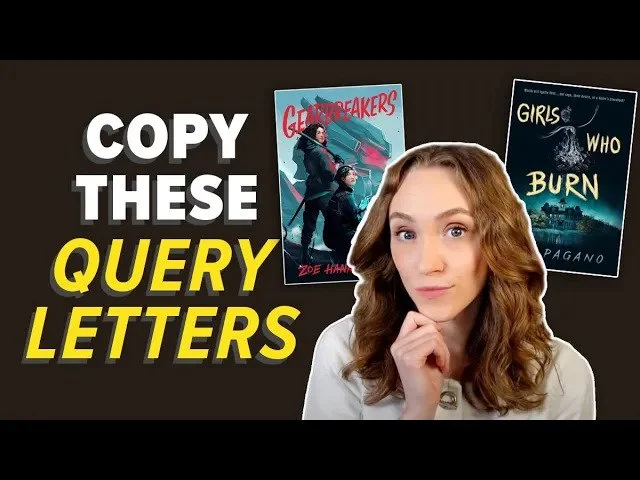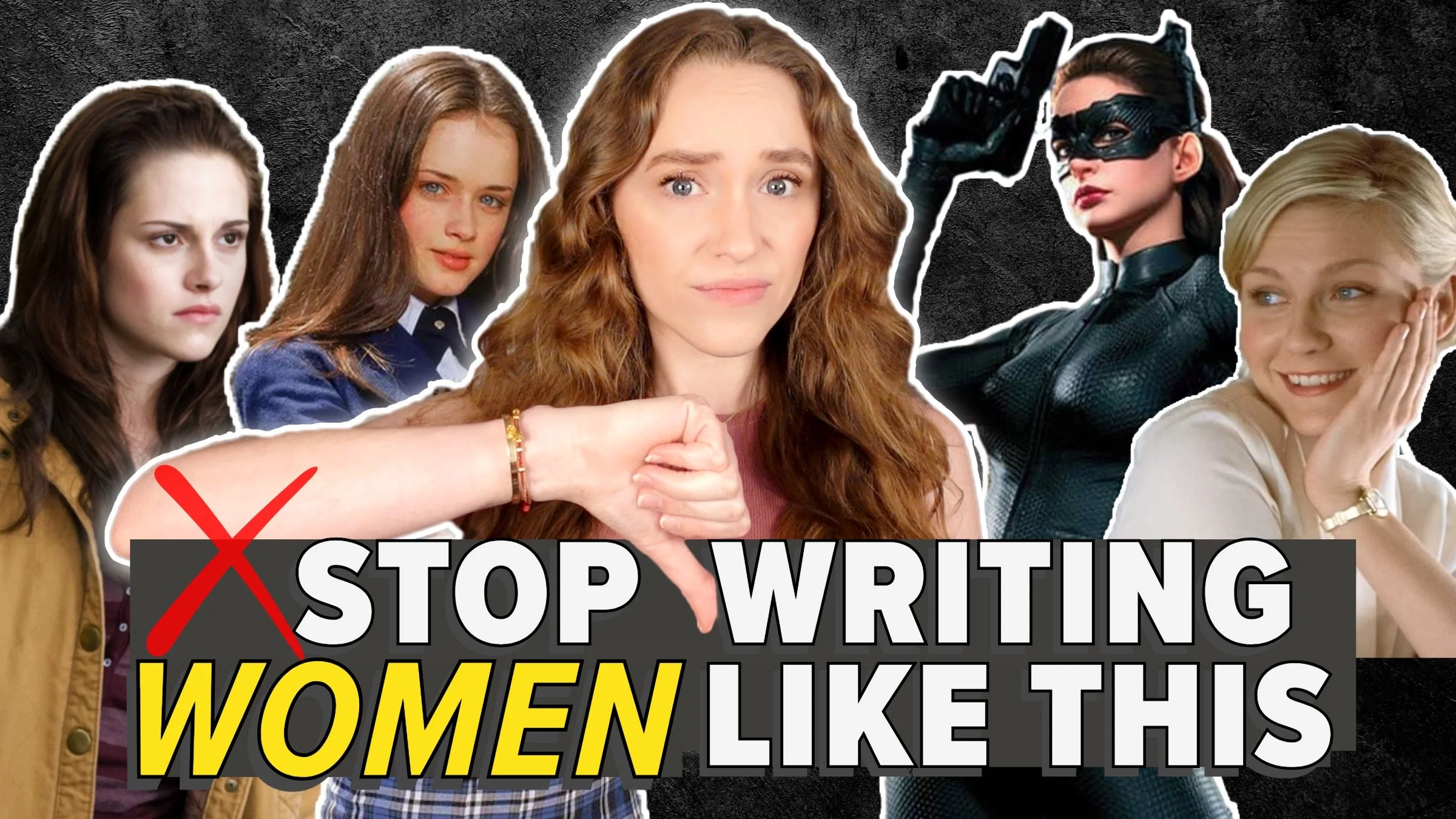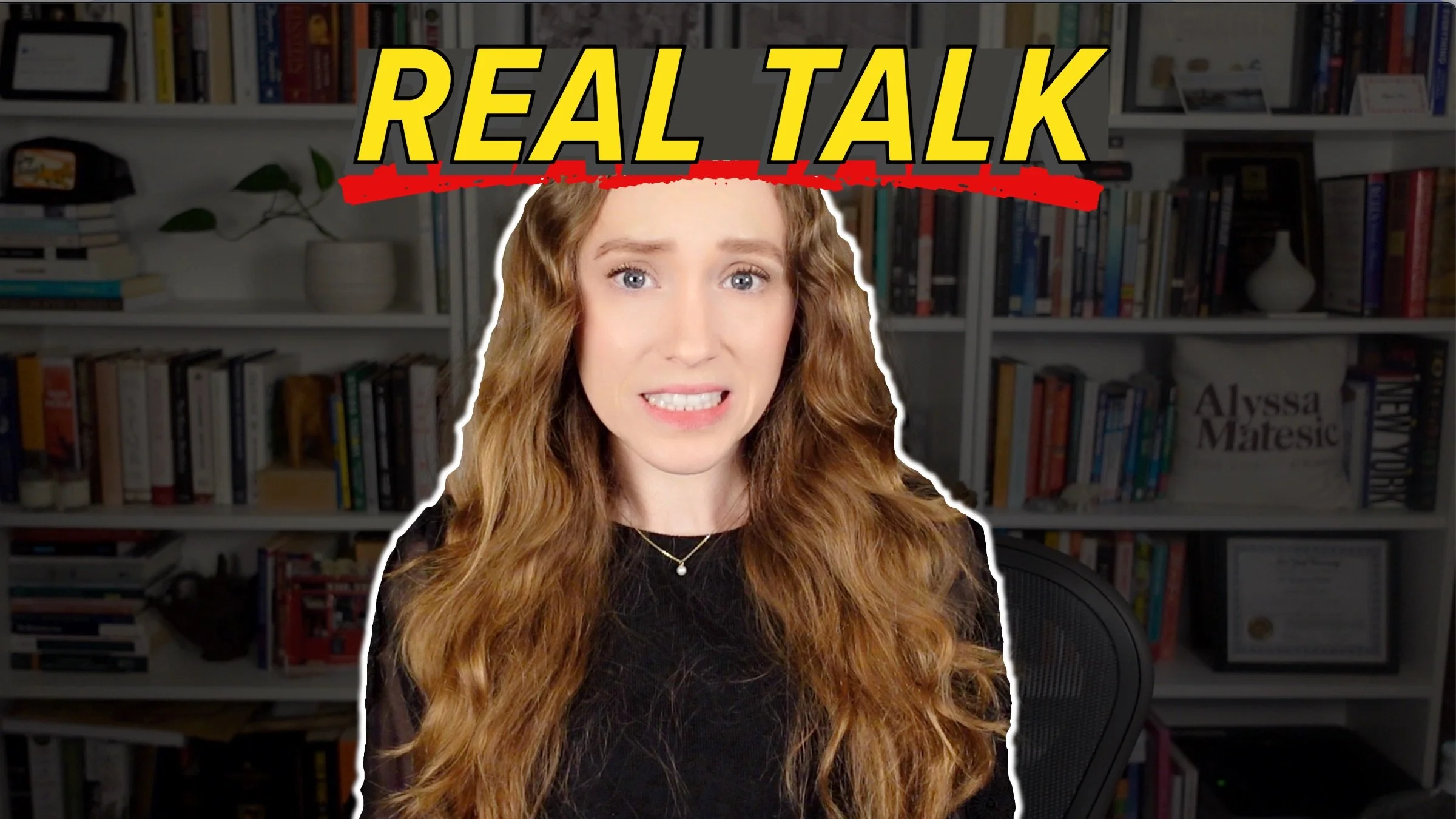Query Letter Examples That Actually Worked – Even Though They Broke the Rules
HIT PLAY OR READ THE POST BELOW:
These query letters broke several rules of querying yet still landed agents. How is this possible? I studied these query letters to identify what these authors did right to land their agents and eventually book deals, and I'm going to share all of that with you today.
You all loved the first installment last month in my successful query letter series, so I'm excited to continue bringing you even more examples and takeaways. I know that trying to craft a strong query letter without seeing an example in action can feel like trying to draw a portrait blindfolded. So, I'm here to show you the way.
Today, I'm going to go through two great query letter examples that actually worked. One is YA sci-fi, and the other is contemporary YA. Both of them take some risks in breaking some of the rules that we commonly see touted about querying. Let me tell you, the second example has a very interesting follow-up story, so make sure you read all the way to the end.
Example Query Letter That Worked: Zoe Hana Mikuta
Let's go through the first example query letter that worked and got the author an agent. This is from author Zoe Hana Mikuta, who is the author of the YA duology Gearbreakers as well as Off With Their Heads. She is repped by Laura Rennert of the Andrea Brown Literary Agency, and this query letter was for her debut novel Gearbreakers.
Dear Agent,
In an age of mechanical deities puppeteered by a power-hungry nation, the sole defense against the onslaught of false Gods is a ragtag group of renegades known as the Gearbreakers, and seventeen-year-old Eris “The Frostbringer” Shindanai takes pride in being one of the most infamous of the lot. Her mission is simple: infiltrate any Windups—a charming nickname for these hundred-foot-tall bionic nightmares—that dare to cross her path, and take the atrocities apart from the inside.
As a top student of Godolia’s famed Windup Academy, Sona Steelcrest is expected to be grateful for the wires shoved through her veins, the microchips implanted along her brain stem, and the cable sockets puckering the skin of her forearms. These Mods mark Sona as a full-fledged Pilot, giving her the ability to synch with the Windups and use their arsenal of detrimental skills to ensure that the nation of Godolia remains sealed to its place of power.
But Sona’s true loyalties lie far outside of Godolia’s grasp, and when she learns of a new model of Windups that could mean the end of the Gearbreakers, she seeks out the Frostbringer’s help. While Eris struggles with putting her desire for Godolia’s peril over her distrust of the wires running beneath Sona’s skin, she finds that Sona’s hatred of the Windups surpasses even her own, and her wariness is soon replaced with feelings far distant from the revulsion that Pilots have always conjured. And, for the first time, Sona has found someone to fight for.
Or more likely, after stumbling across a dangerous opportunity to destroy Godolia once and for all, someone to die for.
I am seeking representation for Gearbreakers, a YA science fiction novel complete at 120,000 words. Gearbreakers is Pacific Rim meets Cinder meets Mockingjay, written for readers who enjoy robot sword fights and battle-primed female protagonists, as well as those who are seeking LGBTQ main characters in the science fiction genre. I am currently an English student at the University of Washington in Seattle, and have a background in kickboxing, which proved to be extremely helpful in shaping the multitude of fight scenes in Gearbreakers. I have pasted the first ten pages of the manuscript below for your consideration.
Best Wishes Always,
Zoe Hana Mikuta
Zoe mentioned that she sent three versions of this query letter before landing on this one, which got her her agent. She felt that the first version was a bit too wordy and that the second version didn't illuminate the stakes of the plot well enough.
I totally recommend iterating on your query letter like this if you are finding that it's falling short or if you are not getting the responses from literary agents that you want. It can never hurt to revisit your query letter, especially your plot blurb section, to make sure it is tight and that it is teasing the plot and the story effectively.
What I love about this query letter especially is that Zoe is giving us a lot of great worldbuilding detail. We understand the broader environment that the characters are operating within, which helps us understand the stakes and the conflict at play. Including worldbuilding to some degree in your query letter is especially important for science fiction and fantasy novels, where we are not operating in our established world, and you need to clue the agent in on some of the key aspects that differentiate this world from our own.
Another really effective aspect of this query letter is that Zoe highlights what unique qualities her book possesses and how it's primed to bring something new to the genre. She mentions robot sword fights, battle-primed female protagonists, and LGBTQ characters in the science fiction genre, all of which could capture an agent's attention if they are interested in any or all of those things. Zoe's query letter comes out under 400 words at 377 words.
Example Query Letter That Worked: MK Pagano
Let's go through the second successful query letter example. This is from author MK Pagano. She is the author of Girls Who Burn, which is coming out this July, and she is repped by Barbara Poelle and Sidney Volon at Word One Literary. This query letter is for a previous novel she wrote called Where the Water Meets the Sky.
Dear Agent,
Eighteen-year-old Taryn knows how to survive: don’t get involved. It’s a lesson she learned all too well when she left everyone and everything behind four summers ago after her best friend Stella died by suicide. But now her dad’s moving out of the country, and Taryn has nowhere to go but back home to the Jersey Shore to face not only her distant mother, but everyone else she left behind.
That includes Adam, the boy she used to love more than anything. When Taryn starts waiting tables at a seaside restaurant, there he is, working alongside her—and suddenly it’s not so easy to stick to her rule. Being around Adam brings back memories of the summer she left, the good and the bad, the bonds she and her friends built and the secrets they kept. And soon the guilt Taryn’s carried for the last four years is all she can think about. Because Taryn is the only one who knows why Stella would have killed herself, and she’s never told anybody.
But one of Taryn’s new coworkers is hiding secrets of his own. And the more time Taryn spends with both the new and old people in her life, the more her memories of that summer shift, until she starts questioning whether Stella really died the way everyone believes she did. Unraveling the truth means confessing old sins and diving back into relationships she’s tried hard to forget—but if Taryn can’t face her past, then just like Stella herself, the truth of Stella’s death and what really happened four years ago will be lost to the sea.
WHERE THE WATER MEETS THE SKY is a contemporary YA complete at 85,000 words. The strong group friendship dynamics and shifting timeline will appeal to fans of Melina Marchetta’s On the Jellicoe Road and the themes of learning to live again after tragedy to readers of Katja Millay’s The Sea of Tranquility.
When I’m not working as a social media director or pondering the angst of the fictional people in my stories, I can be found reading up a storm, baking galettes while listening to French music, and spending time with my own friends and family, whom I could never leave behind for anything. This is my first novel.
Best,
MK Pagano
This novel has a shifting timeline element, but the author chose to focus on the main contemporary storyline for the purposes of the plot, which keeps it super focused. She makes it easy for us to grasp the situation that the protagonist has found herself in and the primary conflict that she faces.
I also really like how MK presented the comps because she mentions the specific elements from each comp that align with her own work, including similar content when she mentions the friendship dynamics, similar structure when she mentions the shifting timelines, and similar themes.
Similar to Zoe, this query letter clocks in at under 400 words at 378 words.
Want a publishing professional to review your query letter?
How These Successful Query Letter Examples Break the Rules of Querying
Now let's talk about how these query letters break some of the common rules that people tout about querying.
Manuscript Length
The first one I want to call out is novel length. In relation to the first query we looked at, Zoe's manuscript was 120,000 words, and this is a YA science fiction novel. While sci-fi as a whole generally tends to run longer than other genres (fantasy falls into that realm as well), anything over 100,000 words, especially for YA, might raise eyebrows for literary agents just because they want to make sure that length is justified. But this query was successful, which goes to show that if you do have a YA sci-fi novel that is on the longer end of the spectrum, it is certainly not impossible for you to get representation.
When you have a longer manuscript, it's always good to just be aware of it and try to trim if it comes naturally and you can do so easily. But if the manuscript justifies that length, it's certainly not a complete dealbreaker for you to get representation and a book deal.
Older Comp Titles
In both Zoe and MK's query letters, they included older comp titles. Zoe got her agent in 2018, so two of her comps were older than five years old, and MK's first comp in her query letter is more than five years old as well.
I know comps are a huge concern for many authors who are putting together their query letters. Admittedly, comps can sometimes be a pain to find, so if you find a perfect comp that really speaks to a specific aspect of your story in a way that no other title does but it's older than five years old, it's not necessarily off the table for you to use it. My recommendation would be to pair it with at least one other comp that is within five years old.
Author Bios
I also want to talk a little bit about the bio paragraphs for both of these query letters. Neither of these authors mentions having formal writing credentials. Both of them were debut authors with no publications under their belt at their time of querying. So please know that it is not a requirement for you to have any type of writing credential to query successfully.
Both of them also mention specific hobbies in their query letter, which is something I don't necessarily recommend including unless you want to or you feel it adds to your query. But in these cases, these little personal details do work well. Zoe mentions her expertise in kickboxing, which speaks directly to the fight scenes in her novel, and MK mentions her love of baking galettes and French music, which gives us a bit of insight into her personality outside of her writing.
All of these are examples of ways that these authors bent the standard rules of querying a little bit, and it worked to their advantage. So, I hope that helps you understand that the rules that people say about querying or writing query letters aren't always as rigid as we think, and you can be successful without following every single rule to a T.
Every Author’s Journey Looks Different
Another interesting fact about both of these authors' querying journeys that I wanted to call out is that both of them are now represented by different agents than the initial agent that they got with these query letters. It certainly happens that authors change agents over the course of their career, so querying might not be a one-and-done process for you.
In MK's case, the novel that she wrote that query for actually died on submission, which is a morbid term that we use when an agent does not sell a book successfully to a publishing house. So, when she and her initial agent went out with this novel to publishers, no one made them an offer.
She queried a totally different book and got a different agent, and now that novel is her debut publication coming out this year. In fact, when she queried that new novel, she got four offers. That's all to say that the querying process is not perfectly linear, and your journey might take you through multiple different book projects or multiple agents, and that is completely fine. Every author's career looks a little bit different, and there's absolutely nothing wrong with that.
Thanks so much for reading, and happy writing!






